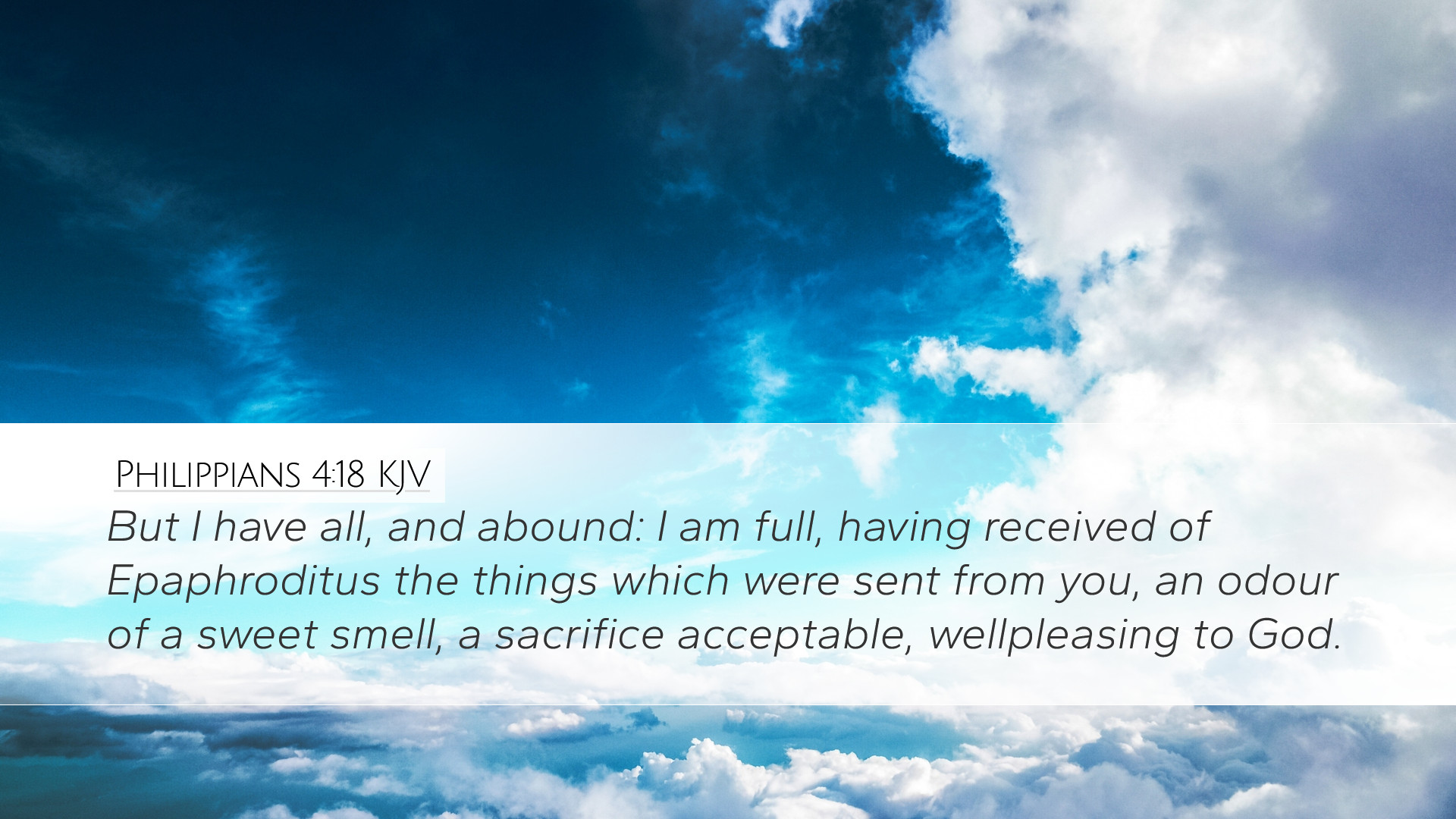Commentary on Philippians 4:18
Bible Verse: "But I have all and abound: I am full, having received of Epaphroditus the things which were sent from you, an odour of a sweet smell, a sacrifice acceptable, well pleasing to God."
Introduction
Philippians 4:18 serves as a concluding affirmation of gratitude from the Apostle Paul to the Philippians. It encapsulates key theological themes of Christian giving, divine provision, and the response of God to the offerings of His people. This commentary synthesizes insights from esteemed public domain commentaries to enrich the understanding of this verse for pastors, students, theologians, and scholars.
Textual Analysis
Paul uses the imagery of abundance and satisfaction in expressing his state of fulfillment. The verse emphasizes the role of Epaphroditus as the messenger and the provision from the Philippian church, highlighting community and fellowship in God’s work.
Paul's Contentment
Matthew Henry notes that Paul's declaration of being "full" indicates a deep spiritual contentment. He transcends mere physical needs, pointing toward a richer experience of God's provision. Paul’s contentment is rooted not in circumstances but in divine sufficiency.
The Role of Epaphroditus
Albert Barnes remarks on the significance of Epaphroditus as a messenger. His name means "charming" or "pleasing," signifying how God uses faithful servants to bring blessings. This underscores the vital role of human agency in the divine economy of grace.
The Gifts from the Philippians
Adam Clarke asserts the importance of the offerings made by the Philippians, characterizing them as a “sweet smell,” reminiscent of the offerings in the Old Testament. This metaphor elevates their gifts to a spiritual dimension, highlighting that God perceives the intentions and sacrifices behind physical gifts.
Theological Insights
The Abundance of God’s Provision
The phrase "I have all and abound" reflects the abundant grace of God. Paul expresses profound gratitude, acknowledging that while he was in need, God’s supply through the Philippians met that need far beyond what he could ask or think.
Acceptable Sacrifice
Paul frames the offerings of the Philippians as “an odour of a sweet smell” which appeals to God. This indicates that acts of generosity are not merely transactional but are acts of worship. They have intrinsic value in the eyes of God, echoing themes from Romans 12:1 where believers are called to present their bodies as living sacrifices.
Implications for Believers
This verse has practical implications for believers regarding the act of giving, service to the church, and understanding the nature of God’s provision.
Encouragement to Generosity
- Philippians’ Example: The Philippians serve as a model of active giving, demonstrating that true partnership in the Gospel compels believers to support one another.
- Sweet Smelling Sacrifices: Believers are reminded that their offerings, whether financial, emotional, or spiritual, are significant acts of love that are pleasing to God.
- Abundant Living: Contentment and satisfaction in Christ can lead to a lifestyle of generosity, offering an inner joy regardless of external circumstances.
Conclusion
Philippians 4:18 highlights the deeply relational and theological nature of giving within the Christian community. It reminds believers of God’s provision, the importance of sacrificial giving, and the joy that comes from being part of His work. This commentary, drawn from the insights of Henry, Barnes, and Clarke, encourages a holistic understanding of how believers can participate in fostering a culture of generosity and gratitude.


